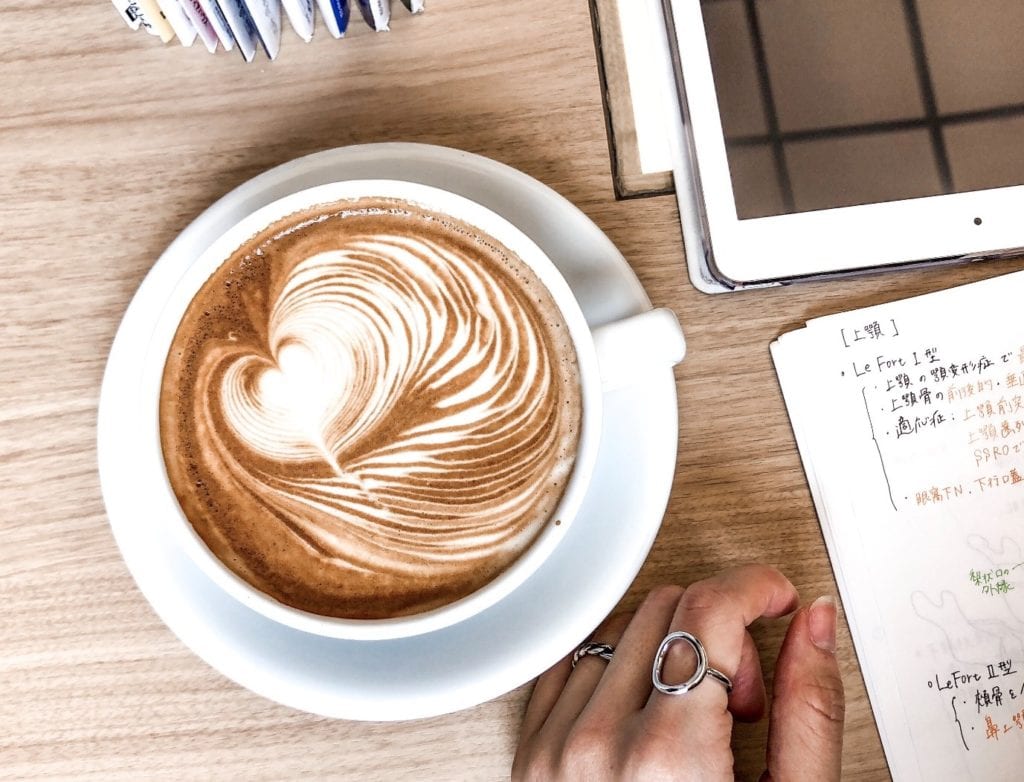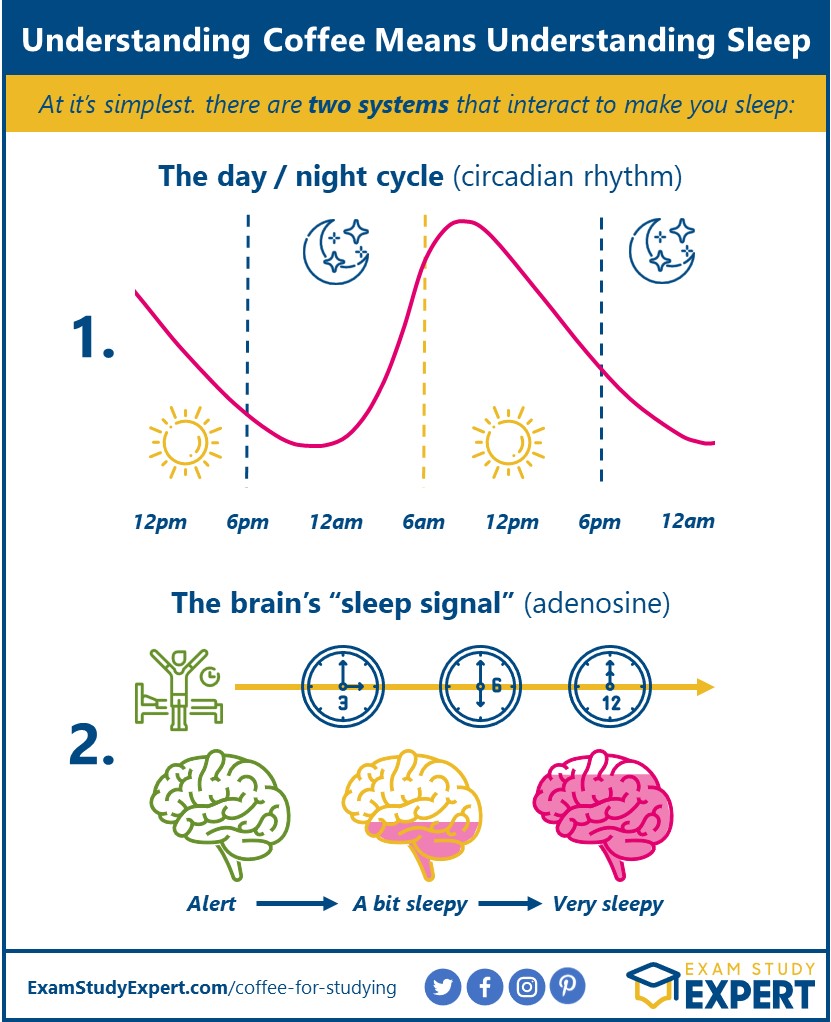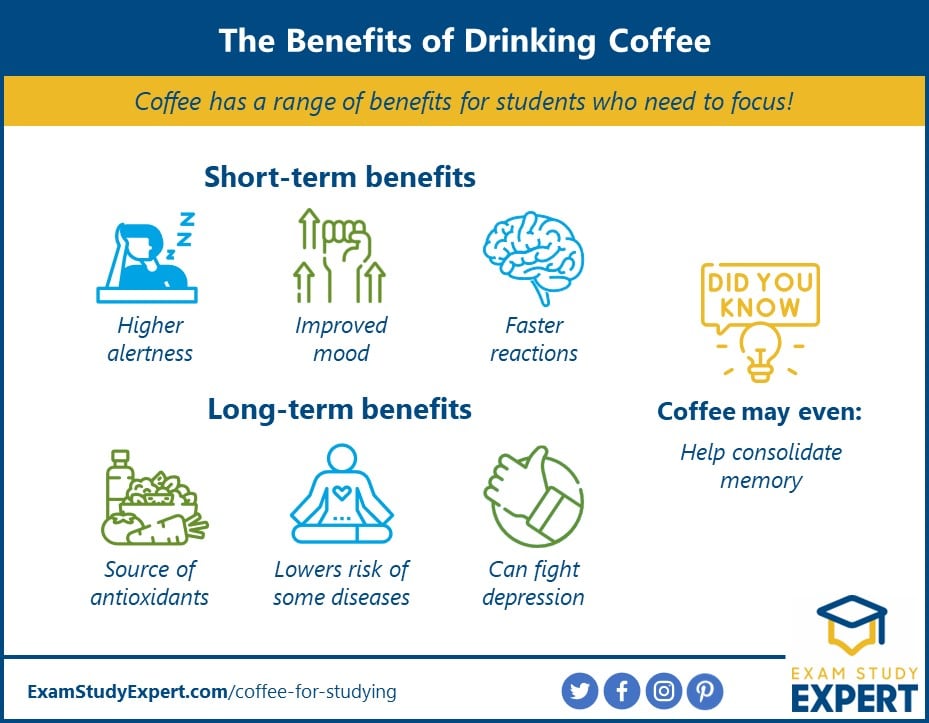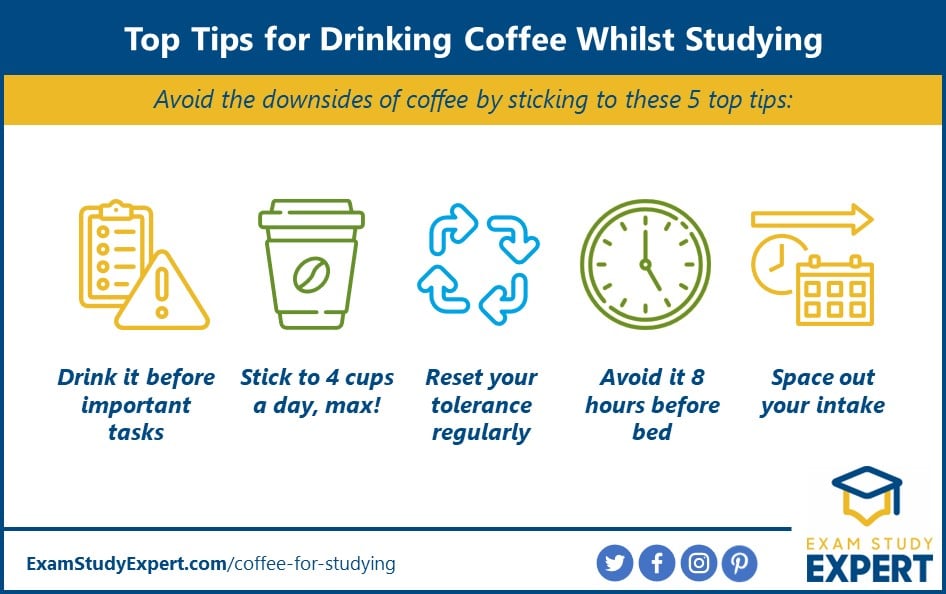Drinking coffee for studying is incredibly popular for many students, fuelling many a late-night study session in the library. Whether you get your supply of study caffeine from a hot cup of coffee or a can of energy drink, the real question is:
Does coffee / caffeine really help you study better?
There’s so much myth floating around, so today, let’s dig into the science and give you a definitive answer, once and for all.
Ready?
Let’s do this.

The surprising science of how coffee works
Most people don’t understand how coffee affects your alertness and sleepiness. And that’s because they don’t understand how sleep works.
The science of sleep* is UTTERLY fascinating: at its simplest, there are two systems that interact to make you go to sleep.
- The circadian rhythm
- You may be familiar with this 24-hour (ish) cycle, which peaks during the day and troughs during the night.
- The brain’s sleep signaller (adenosine)
- Separately to the circadian rhythm, a chemical called adenosine gradually builds up in the brain the longer we stay awake. Adenosine is only broken down when you get a good night’s sleep, so the longer you’re awake, the more of it builds up. And the stronger you feel the pull of your pillow!

How sleepy you feel at any given moment is basically a combination of where you are in your circadian cycle, plus how much “sleep signal” chemical is in your brain.
Caffeine works by temporarily knocking all of the sleep signal (adenosine) off its receptor sites in the brain. That tricks the brain into thinking you’ve just woken from a refreshing sleep, giving you that nice feeling of alertness.
The benefits of drinking coffee for studying
Now that we understand how caffiene interacts with our sleep cycles, the big question is:
How can I use that knowledge to benefit my studies?
Happily, there are several short-term AND long-term benefits to drinking coffee that are perfect for work and studying:

Good news: coffee has a number of short-term benefits for students
Coffee not only helps you to focus – there are a nice range of boosts that give you a “turbo-charge” when you’re studying:
- Higher levels of alertness
- Improved mood
- Faster reaction times
Fun fact: It’s even been suggested that caffeine helps consolidate memory, which means drinking coffee while studying could help form stronger long-term memories. It’s a pretty wild idea – though don’t see it as a silver bullet to solve all your learning problems, remember to practice good memorisation strategy at all times.
Coffee even has benefits for your long-term health
Some of the other chemical compounds in coffee have a range of very positive side effects:
- One of the biggest sources of antioxidants in the standard Western diet (more than fruit and vegetables combined for many people)
- Lower risk of Type 2 diabetes
- Lower risk of Alzheimer’s and Parkinson’s disease
- Can fight depression
- May even lower your risk of colorectal and liver cancer
It’s generally thought that at least most of these benefits persist in decaf coffee (as far as we can tell from the available research).
So coffee’s golden, and we can go nuts on the stuff?
Not quite…
The downsides: using coffee to study now could give you problems later…
Once the caffeine boost wears off, all that sleep signal (adenosine) that you’d displaced suddenly rushes back into the brain, flooding your brain with instruction to “go to sleep!”.
The result? An energy crash.
So when you drink coffee for studying, you’ll enjoy an energy boost for a few hours, then likely slump back to a worse state than you were before.
You’re effectively borrowing energy from later in the day, and the debt has to be repaid at some point.

But that’s not all…
Sleep, interrupted
When we drink coffee, especially later in the day, it interferes with our actual sleep.
Even if you manage to fall asleep, the quality of your sleep will be adversely affected when there’s still caffeine in your system. So you’re more likely to wake up groggy the next day.
Caffeine can take up to 9 hours to clear from your body. That means that any that you drank in the afternoon will likely still be in your bloodstream by bedtime.
That means you’ll end up more dependent on that morning coffee hit to get you going the next day.
… leading to a caffeine crash in the afternoon …
… leading to yet more afternoon coffee to keep you going, and another poor-quality night’s sleep later.
It’s a vicious cycle if you get stuck in it.
Your tolerance to caffeine may change
Researchers are still thrashing this one out, but some evidence is in line with many users’ experience:
The more coffee you habitually drink, the more you need to drink in order to feel the same kind of buzz as before.
If you normally drink little or no caffeine, it may only take a single cup to give you a powerful kick; it might take a heavy coffee drinker an entire pot to get the same effect.
It’s not always convenient to have to consume vast quantities of coffee to get a boost. If nothing else, it’s expensive, especially if you buy your coffee from a barista at $3.50 a time!
But the good news is that you can reset your caffeine tolerance. Coffee experts reckon you can do it in about a week of going completely “cold turkey”, or if you prefer, you could cut down your intake gradually over time.
My 5 top tips to get the most out of coffee for studying
The trick is balancing the short-term benefits with the longer-term problems.
Here are 5 strategies to help:

- Consider using coffee before your most important tasks, when you’ll benefit most from the boost, rather than habitually.
- If you’re a coffee addict, aim to stick to no more than 4 cups a day (equivalent to 400mg of caffeine) – after that, researchers suggest the benefits drop off and the problems rise significantly.
- Reset your caffeine tolerance every once in a while.
- Avoid drinking coffee 8 hours before bed time, to ensure you get a good night’s sleep and wake up refreshed in the morning.
- Try to space out your intake rather than going for it all at once, to smooth out the peaks and troughs in your focus / energy.
For more tips on getting motivated to study, check out some of my favourite study motivation strategies.
The verdict: does coffee help you study?
In the short term: coffee will give you a boost to energy and focus, which will certainly help you study with more intensity.
But in the long term: a combination of the energy swings (the energy crash that follows later in the day) and disrupted sleep could, overall, make your life increasingly difficult, especially if you’re overdoing the caffeine intake.
Personally, I love drinking coffee, but I use it strategically: riding that boost for specific projects or when I need to squeeze the most from my brain, like the moment I sit down with a pile of research notes and try to piece them together into an article, essay or even a book*.
The rest of the time, I try to abstain (or stick to a nice decaf) to keep my energy and focus levels more stable, and to enjoy high-quality sleep at night. (If you’re looking for a quality decaf blend, try this one*.)
As with all good things in life, enjoy in moderation.
I’ll raise a cup of coffee to that – good luck in your studies!
*As an Amazon Associate, I may earn from qualifying purchases, at no extra cost to you. I make these recommendations based on personal experience and because I think they are genuinely helpful and useful, not because of the small commissions I receive.
- [PODCAST] Peps McCrea: Hacking Study Motivation With Psychology - 27 Jan 2024
- Your Word Of The Year – Setting You Up For Success [PODCAST] - 2 Jan 2024
- Holiday Season Study Tips [PODCAST] - 21 Dec 2023




Thanks for writing this blog. It is very interesting to read and at the same time, it is quite helpful.